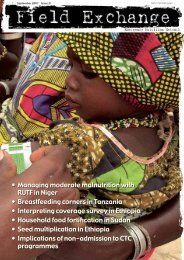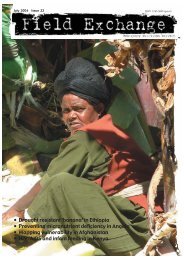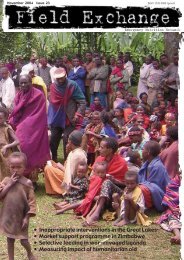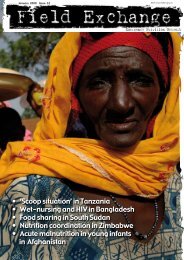Download PDF - Field Exchange - Emergency Nutrition Network
Download PDF - Field Exchange - Emergency Nutrition Network
Download PDF - Field Exchange - Emergency Nutrition Network
You also want an ePaper? Increase the reach of your titles
YUMPU automatically turns print PDFs into web optimized ePapers that Google loves.
<strong>Field</strong> Article<br />
In response to a food shortage in 2002,<br />
Concern Worldwide and Valid<br />
International piloted a Community-based<br />
Therapeutic Care (CTC) project in two<br />
districts in Malawi. The two pilot projects were<br />
largely considered a success based on coverage,<br />
community acceptance, and treatment<br />
outcomes. In 2004, the Malawi Ministry of<br />
Health (MoH) agreed to expand CTC to additional<br />
districts in order to assess different<br />
approaches to implementing the programme.<br />
When a second food shortage occurred in<br />
2005, the MoH encouraged other organisations<br />
wanting to contribute to the emergency<br />
response to use the CTC approach. Four organisations<br />
responded, setting up CTC<br />
programmes in 10 additional districts.<br />
At the beginning of 2006, a national stakeholder<br />
workshop was held to share experiences<br />
from all CTC programmes in Malawi and to<br />
review the evidence in support of scaling up<br />
CTC in a non-emergency context. The review<br />
found that CTC programmes achieved rates for<br />
cure, death, and default that were within<br />
Sphere standards and that CTC had the potential<br />
to reach more children than the traditional<br />
inpatient therapeutic feeding approach.<br />
Although CTC programmes had been solely<br />
implemented by non-governmental organisations<br />
(NGOs) up to that point, the review found<br />
that there were favourable conditions for scaling<br />
up CTC nationally, including local production<br />
of Ready to Use Therapeutic Food (RUTF)<br />
and existing community outreach structures.<br />
As a result of this workshop, in April 2006<br />
the MoH publicly confirmed its intention to<br />
scale up CTC to all 28 districts in Malawi, and<br />
to integrate CTC into the Malawi health system<br />
to make it more sustainable.<br />
The Challenge: National Scale-Up<br />
Although the MoH had endorsed the scale-up<br />
of CTC, a number of challenges were evident.<br />
Key among those was the wide variety of<br />
approaches being used by different organisations,<br />
poor communication among stakeholders,<br />
and a lack of involvement of government<br />
staff at the district level. Stakeholders and<br />
donors also had serious concerns about the<br />
sustainability of the programme, given the high<br />
cost of RUTF.<br />
It became clear that a number of things had to<br />
happen for CTC to be effectively scaled up in<br />
Malawi:<br />
1. A standardised approach, including clear<br />
protocols, national guidelines and a monitoring<br />
and evaluation system, was needed<br />
across all districts.<br />
2. Extensive technical support and capacity<br />
building was needed at the national and<br />
district levels to support government staff<br />
to take up CTC services and maintain quality.<br />
3. A national system for monitoring and evaluating<br />
nutrition programmes was needed<br />
for planning and to ensure the quality of<br />
CTC.<br />
4. Coordination and communication among<br />
all stakeholders needed to be improved to<br />
promote learning and programme<br />
effectiveness.<br />
5. Strategic planning and advocacy within the<br />
MoH and among partners was required to<br />
integrate CTC into the health system functionally,<br />
in order to ensure future funding<br />
and improve cost-effectiveness, and thereby<br />
make CTC more sustainable for the government<br />
to manage.<br />
The Approach: CTC Advisory Service<br />
A recent article on how to achieve wide-spread<br />
change in global health emphasised that simply<br />
spreading information on the success of a new<br />
approach is not enough to ensure it is scaled-up<br />
effectively. The authors noted that “Even when<br />
health care systems leaders or clinicians become<br />
aware of a promising innovation, their ability to<br />
introduce it is often severely constrained by<br />
limitations of time, resources, and skill.” The<br />
authors concluded that “most innovative technologies…must<br />
be actively, not passively,<br />
spread, or they may not spread at all.” 1<br />
This was certainly the case in Malawi –<br />
although the MoH took on primary responsibility<br />
for scaling up CTC, it was obvious that<br />
limited resources, time, staff and expertise<br />
within the MoH would be a major barrier.<br />
Recognizing these limitations, the MoH chose<br />
to take an active approach to scaling up CTC<br />
and in 2006, formed the CTC Advisory Service<br />
(CAS) in partnership with Concern Worldwide.<br />
CAS was conceived as a 5-year project, with<br />
a team of experienced nutrition<br />
and monitoring and evaluation<br />
(M&E) officers who act as a technical<br />
arm of the Ministry of<br />
Health’s <strong>Nutrition</strong> Unit to facilitate<br />
the scale-up of CTC, while<br />
building the capacity of the<br />
government to take on CTC<br />
management.<br />
Under a simple Memorandum<br />
of Understanding (MOU) with<br />
the government, CAS was given<br />
the mandate to coordinate, monitor,<br />
and evaluate CTC activities,<br />
provide technical support and<br />
capacity building for CTC at the<br />
national and district level, standardise<br />
tools and materials used<br />
for CTC in the country, and<br />
continuously advocate for the<br />
scale-up and integration of CTC<br />
into the health system.<br />
The MoH provides leadership and direction<br />
for CAS activities, while Concern Worldwide is<br />
responsible for the day-to-day management<br />
and administration of activities. The project has<br />
been funded by several donors, including<br />
USAID, UNICEF, and Irish Aid.<br />
Main achievements<br />
In the last two years, CTC has spread more<br />
rapidly than was originally expected. Since<br />
CAS began operating, it has provided support<br />
to 25 districts to initiate and carry out CTC. As<br />
of November 2008, 21 districts, out of 28 in the<br />
country, have started CTC and six more are in<br />
the stages of training or planning.<br />
CAS has been instrumental in facilitating the<br />
development of national CTC guidelines, along<br />
with standardised reporting forms and job aids,<br />
which have been printed and disseminated to<br />
all districts by UNICEF. These tools are now<br />
being used by all districts.<br />
CAS has also taken the lead on developing a<br />
national monitoring and evaluation system.<br />
District HMIS (Health Management<br />
Information System) officers have been trained<br />
to compile monthly health centre data using a<br />
national database that incorporates reports<br />
from Outpatient Therapeutic Programmes<br />
(OTP), <strong>Nutrition</strong>al Rehabilitation Units (NRU),<br />
and supplementary feeding programmes. The<br />
Elizabeth Jordan-Bell, Malawi, 2008<br />
MoH has taken on responsibility for collecting<br />
CTC programme data, but CAS still supports<br />
with analysis and reporting. Districts that show<br />
poor performance are prioritised for CAS<br />
support.<br />
Another achievement is the development of a<br />
team of national CTC trainers, along with a<br />
draft training manual for CTC. A total of 46<br />
health staff from throughout the country has<br />
been trained to provide training and technical<br />
support on CTC. This is an important step in<br />
ensuring that the work of CAS can be continued<br />
by the government once the project ends. While<br />
CAS continues to monitor training quality and<br />
mentor the national trainers, all district-level<br />
trainings are now conducted by MoH staff.<br />
Finally, CAS has played an important role in<br />
coordinating CTC activities and facilitating<br />
better communication among stakeholders. The<br />
CTC Learning Forum, which brings together<br />
people involved in CTC several times a year,<br />
has been an effective tool for sharing and replicating<br />
best practices and lessons learned.<br />
Attendees of the 7th CTC Learning<br />
Forum practice conducting supervision<br />
at an OTP session.<br />
Challenges<br />
Although a great deal of progress has been<br />
made over the last two years, there is still much<br />
work to be done before CTC is fully scaled up<br />
and integrated into the health system.<br />
There was no initial strategy developed to<br />
guide the scale-up process, and as a result scaleup<br />
has occurred rapidly and haphazardly.<br />
Scale-up and support from CAS has been reactive,<br />
driven largely by demand from district<br />
health offices and supporting NGOs. CAS<br />
recently developed criteria for prioritising<br />
districts for support visits, but no such criteria<br />
were used to guide the scale-up process. CAS is<br />
currently facilitating the development of a<br />
national plan of action for carrying out the<br />
work that is remaining, focusing on integrating<br />
CTC into the Malawi health system. The plan<br />
will include specific actions for achieving the<br />
plan, and will specify the roles and responsibilities<br />
of all stakeholders.<br />
From the outset, there has been confusion<br />
over the role of CAS. CAS’s mandate was not<br />
clearly communicated to districts, and initially<br />
some NGOs did not welcome CAS involvement<br />
1<br />
McCannon, C.J., Berwick, D.M., Massoud, M.R. “The<br />
Science of Large-Scale Change in Global Health” Journal of<br />
the American Medical Association, October 24/31, 2007. Vol<br />
298, No 16.<br />
18
















